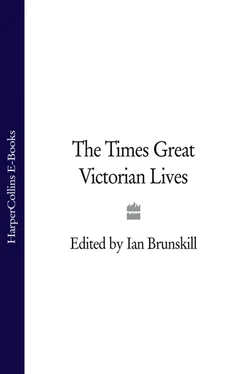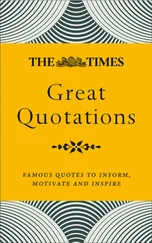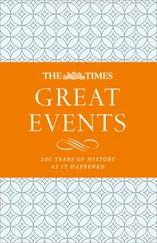Ian Brunskill - The Times Great Victorian Lives
Здесь есть возможность читать онлайн «Ian Brunskill - The Times Great Victorian Lives» — ознакомительный отрывок электронной книги совершенно бесплатно, а после прочтения отрывка купить полную версию. В некоторых случаях можно слушать аудио, скачать через торрент в формате fb2 и присутствует краткое содержание. Жанр: unrecognised, на английском языке. Описание произведения, (предисловие) а так же отзывы посетителей доступны на портале библиотеки ЛибКат.
- Название:The Times Great Victorian Lives
- Автор:
- Жанр:
- Год:неизвестен
- ISBN:нет данных
- Рейтинг книги:3 / 5. Голосов: 1
-
Избранное:Добавить в избранное
- Отзывы:
-
Ваша оценка:
- 60
- 1
- 2
- 3
- 4
- 5
The Times Great Victorian Lives: краткое содержание, описание и аннотация
Предлагаем к чтению аннотацию, описание, краткое содержание или предисловие (зависит от того, что написал сам автор книги «The Times Great Victorian Lives»). Если вы не нашли необходимую информацию о книге — напишите в комментариях, мы постараемся отыскать её.
The Times Great Victorian Lives — читать онлайн ознакомительный отрывок
Ниже представлен текст книги, разбитый по страницам. Система сохранения места последней прочитанной страницы, позволяет с удобством читать онлайн бесплатно книгу «The Times Great Victorian Lives», без необходимости каждый раз заново искать на чём Вы остановились. Поставьте закладку, и сможете в любой момент перейти на страницу, на которой закончили чтение.
Интервал:
Закладка:
War, except on the most hazardous conditions, was clearly out of the question. Could, then, the Emperor resolve on peace? Peace he could certainly have with the world if he could only have it with France. The Emperor Napoleon was not cast in the mould of heroic conquerors. He was cold, cautious, even to the extreme of moral timidity. He had no love for war, at least for war’s sake and on a large scale. He had a great respect for ‘the odds’ in any game. He never would launch France on an equal duel with Germany. The difficulty lay in preventing France from dragging him into such a war against his better judgment. All his sayings and doings since Sadowa had but one object – to humour, to soothe, to reassure French opinion. Faith in his infallibility, he conceived, was shaken in others as well as in himself; that his wonted good fortune had to some extent forsake him, that black spots were looming in the horizon, he had himself deemed it necessary to avow. It was now important for him to allay the apprehensions he had himself created, to restore the confidence which his words had undermined as much as his deeds.
The real question, however, lay in the estimate the Emperor could arrive at with respect to the state of public opinion. He had lived for many years away from the Throne; he was a man of the world, a cool, shrewd observer, and might form a correct judgment of whatever came before his eyes. But for the last twenty years he was labouring under the ‘curse of Kings.’ He had deprived France offree utterance. He must either take her at a rude guess or see her through the medium of that cumbrous scaffolding of official administration which he had reared between himself and the nation instead of the regular edifice of a responsible Government. Besides the France he had studied in the writings of M. Thiers, or in the Mémorial de Sainte Héléne, or that he had contemplated through the bars of his prison windows at Ham, he only knew the France which Messrs. De Morny, Persigny, or, at the utmost, Messrs. Billault and Rouher chose to describe to him; a France more Imperialist than the Emperor, more illiberal than the Deux Décembre. The only safety out of his embarrassing position could be found in his abdicating absolute power. Atonement for the errors of the past could best be made by relinquishing undivided responsibility for the future. To make up to the nation for its somewhat tarnished glory abroad it was before all things advisable to restore its liberties at home. His first movement upon having to acknowledge ‘the force of irresistible circumstances’ was to throw himself upon his people. The first result of the disaster of July, 1866, was the letter of January, 1867.
Between the ‘Elected of December,’ however, and the millions of his electors there was a conditional, though an irrevocable, compact. The French nation – or, at least, that part of it which constituted a majority resulting from the experiment of universal suffrage – had accepted its ruler on his own terms. The alternative lay between order and freedom, and he said ‘Order at all events; Freedom whenever it might be.’ As a President and as an Emperor, Napoleon always deemed the perfection of government to lie in the combination both of legislative and executive power in the same hand. His notions of a Constitution were those of the Consulate and the First Empire, and he seemed to forget that the concentration of all power in one hand had only been deemed advisable by the First Napoleon when he aspired to grasp France as a sword, and that the system had broken down, by confession of its original inventor, towards the close of his reign. With a new Empire which was to be ‘Peace’ there was no longer a necessity for the same strong military organization, and liberty should, therefore, have been compatible with it. But the tendency of the people, like that of their ruler, at the time was towards energetic repression. Society had to be saved. War to the bitter end was to be waged – not against foreign enemies, but against domestic parties. Even for such a war a Dictatorship was found indispensable. The State was constituted in the shape of a pyramid, with nothing between the electing masses at the base and the elected Autocrat at the point. Yet something like regret and misgiving seemed at times to assail the Sovereign in the awful solitude of his elevation. It was not for his own sake, not from personal ambition, he hinted, that so unbounded a power had been placed in his hands. He held it simply on trust. The people’s liberties were only in abeyance. Indeed, a show was made now and then of slackening the reins of Government. Imperialism was described as by its nature progressive. It was considered as a temporary structure – a means to an end; the application of force to the establishment of legal authority. When the end was attained, when order could be pronounced quite safe, the superstructure should be removed, and the ‘crowning of the edifice’ would follow.
It is difficult to say to what extent the Emperor deceived himself or others. But, whatever his intentions might be, they could not be carried into effect without far greater resolution than seemed at any time to be at his command. His rule had sprung from the masses; it was identified with the multitude. He had ascended the Throne as the ‘Working Man’s Friend; the Emperor of the Peasant.’ The millions who reigned through him were not as ready to resign their supremacy as he, perhaps, might have been. The Senate consisted of his own nominees; the Legislative Body was elected by constituencies over which his Administration was supposed to exercise almost absolute control. But there was in that Senate, in that Elective Assembly, in that Administration, in that vast mass of voters, a party, a vastly predominant party, which would stand up for Imperialism even against the Emperor. With such a Constitution as the Emperor framed mere legislative improvement must needs be illusory. It was impossible to get over the fact that in a State like the France of the present day the mass of the nation overrode its intelligence; the body crushed the soul. The reign of the upper and middle classes had come to an end in that country with the first and second revolution. It was now the turn of the multitude, and the only question was whether the Government should be in the hands of a mere mob or in that of a mob-delegated despot. With all its purple and gold the Imperial Government was heir to the communistic notions of the Red Republican régime. The Emperor’s mission was to tax the rich for the benefit of the poor. By his arbitrary control over the price of bread, by his promotion of public works, the Emperor was perpetually bringing back his authority to its original sources. Put that authority to the test of a hundred elections, and the suffrage would always give the same results.
This assurance of almost boundless popular support was a source of weakness no less than of strength. With the exception of a few ambitious statesmen, and still fewer more or less devoted friends of the fallen dynasties, there were no elements for wholesome legal opposition in France. Hence the various proposals of the Emperor for an extension of constitutional liberties could hardly find sufficient support from the enlightened classes to overcome the mutinous ill-will of the mob-majority. It required the personal influence of the Sovereign to force even such paltry measures as the Press and Public Meetings Bill through a Legislature otherwise too ready to endorse all other Imperial Acts of home and foreign policy.
A Government placed so widely above all check or hindrance had it certainly in its power to achieve much, and twenty years of Imperial rule have not been without most splendid results for the general welfare of France. Within its own boundaries the country had never known a period of greater material progress. Beyond them, till very recent times, it had exercised an ascendency grounded on a moral prestige more than commensurate with its actual strength. The recognition of the advantages of Prussia’s military system came most inopportunely for the Emperor to confirm a favourite saying of his, ‘That a nation’s influence is gauged by the number of soldiers it can bring into the field.’ The Army Bill was no doubt a disastrous measure for him, but he had been drifting into a most difficult dilemma. He had to choose between resigning himself to a condition of comparative weakness, which must infallibly be exposed sooner or later, and a measure that levied ‘a tribute of blood’ on the classes where he found his warmest supporters. The dilemma was a difficult one. The Emperor had, indeed, asserted his ascendency by a pretension of controlling circumstances which had passed almost unchallenged. He had biased the policy of Europe by merely indicating the attitude of France. But the state of affairs had been insensibly shifting, until he had become conscious of a pressure he was powerless to resist. He had been led by Cavour, and the astuteness of the Italian statesman had betrayed him into positions where his only safety lay in pressing onwards. Now he was being forced by Bismarck. As Germany grew strong Europe was threatened with a change of masters, and it seemed that in the future the impulses in European politics might come as probably from Berlin as from Paris. The Emperor’s sense of the change was indicated by his language. He affected to consider the disruption of the German Confederation as a weakening of Germany. One of those inspired pamphlets that appeared from time to time traced the parallel between the First and the Second Empires to the advantage of the latter. Napoleon III and his uncle had been revolving in identical historical cycles. But the pamphleteer stopped short in his comparisons. He neglected to point out that Sadowa, with its disclosures more than its successes, was the Moscow of that Second Empire which was paying the penalty of the domineering pretensions of the First. The Seven Weeks’ War demonstrated the results of that military system which France had forced upon Prussia after the crowning victory of Jena. Now the Emperor recognized that, thanks to the apathy or irresolution he had certainly not borrowed from his uncle, the regular standing armies of France had to count with a nation of civilian-soldiers, trained, armed, and organized. He felt there was truth in the invectives of those political opponents who, appealing to the pride of France, told him he had blundered away France’s commanding influence. It must be proved sooner or later whether he or they were in the right, and, with a belief in his destiny which had begun to falter, he set himself to prepare for the inevitable test.
Читать дальшеИнтервал:
Закладка:
Похожие книги на «The Times Great Victorian Lives»
Представляем Вашему вниманию похожие книги на «The Times Great Victorian Lives» списком для выбора. Мы отобрали схожую по названию и смыслу литературу в надежде предоставить читателям больше вариантов отыскать новые, интересные, ещё непрочитанные произведения.
Обсуждение, отзывы о книге «The Times Great Victorian Lives» и просто собственные мнения читателей. Оставьте ваши комментарии, напишите, что Вы думаете о произведении, его смысле или главных героях. Укажите что конкретно понравилось, а что нет, и почему Вы так считаете.












